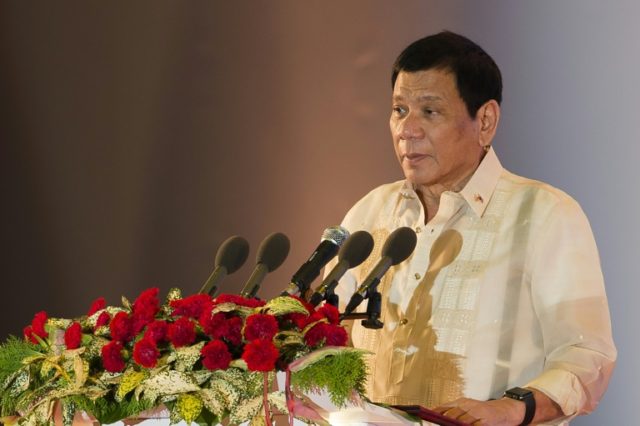Philippines President Rodrigo Duterte announced Thursday that national police have compiled a new list of public officials with ties to the nation’s illicit drug trade, and that he is preparing to make the over one thousand names public, with the blessing of Congress.
“The final report is there. I’m going to make it public. I spoke with Congress and asked them what I will do with this. There are 1,000 barangay [neighborhood] captains, policemen, mayors, governors and judges,” the president announced Thursday. He has not named anyone on the list yet, though he has made clear his suspicions.
“I have asked the intelligence community, the PDEA (Philippine Drug Enforcement Agency) and the NICA (National Intelligence Coordinating Agency) to fine-tune the list,” he added, likely a response to the first round of public official names made public last month.
In August, Duterte read aloud a list of 150 names of policemen, public officials, and soldiers that the Philippine National Police (PNP) had evidence of having participated in drug trafficking. Duterte fired them all in a speech effective immediately, relieving them of their access to taxpayer-funded security and demanding they all turn themselves in to police. The removal of state security for the individuals, which included mayors and congressmen, was a response to a violent episode in the town of Albuera, where Duterte ordered police to arrest Mayor Rolando Espinosa, but were forced to kill six of his security guards in a raid. Espinosa was charged with protecting drug traffickers and his son, the fugitive Kerwin Espinosa, is known as one of the wealthiest drug traffickers in the Philippines. The younger Espinosa participates most actively in the trade of “shabu,” or methamphetamine.
The original list of suspects received significant criticism for being outdated and including names of judges and policemen who had already died. Seeking to avoid this situation once again, Duterte expressed more caution in releasing the larger list. At least two names on the list, however, are already public: Senator Leila De Lima and Congressman Amado Espino Jr., who the website Rappler notes have both denied having any involvement in drug trafficking.
De Lima has emerged as one of Duterte’s most-targeted politicians, and has herself worked to oppose Duterte’s war on drugs by highlighting his police tactics as mayor of southern Davao City before being elected president. De Lima called to testify before Congress this week a man claiming to have worked as a hitman in one of Duterte’s Davao “death squads.” Edgar Matobato claimed that Duterte had ordered the bombing of a mosque as mayor, as well as the execution of a number of suspected drug traffickers. Matobato also alleged that Duterte had ordered the killing of journalist Jun Pala, who Duterte had posthumously referred to as a “rotten son of a bitch.”
Duterte assumed the presidency in June, winning the election by promising to eradicate the Philippines’ pervasive drug problem. According to Manila, nearly four million Filipinos are suffering from drug addiction, and at least 500,000 have surrendered to police since Duterte’s tenure began, seeking rehabilitation treatment. Duterte is offering addicts the opportunity to be interned in a rehabilitation facility if they play no role in trafficking drugs, but has promised to “kill” anyone who does not surrender to police, trafficker or addict. The Philippine Star estimates that nearly 3,000 people have been killed in drug-related police activity since June.

COMMENTS
Please let us know if you're having issues with commenting.